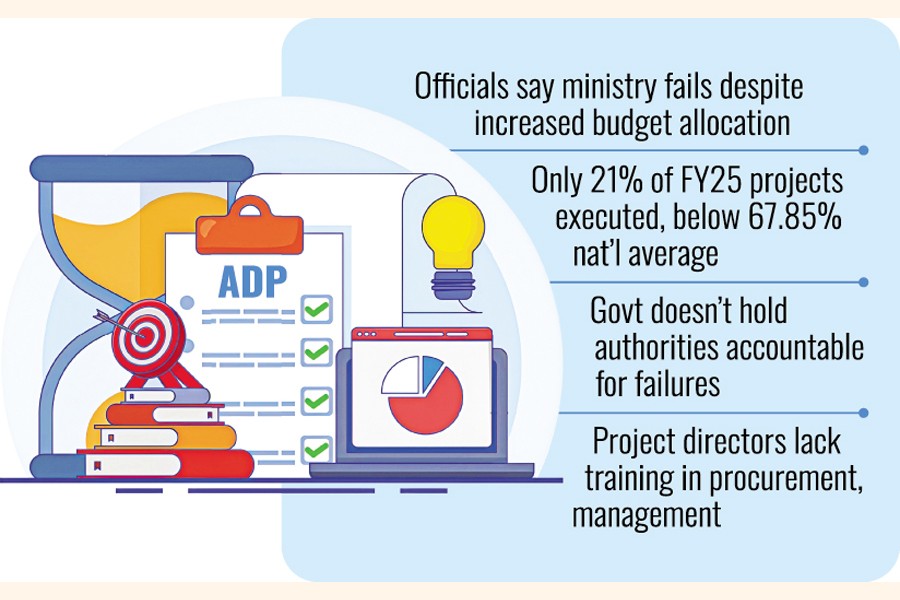DEVELOP PROJECTS
ADP shortfalls expose inept handling in health ministry
Officials call for reform after decade-long ministry underperformance

Published :
Updated :

The Ministry of Health and Family Welfare needs reform, as officials say its decade-long underperformance - the worst among government agencies - has left Bangladesh's health services increasingly vulnerable, with only 21 per cent of development projects implemented in the fiscal year 2024-25.
Analysts say that although the government has increased budget allocations year-on-year, the health ministry, one of the country's key stakeholders, has repeatedly failed to execute its projects effectively.
The government had not questioned or held ministry officials accountable for these failures, sources also noted.
Officials from the Implementation Monitoring and Evaluation Division (IMED) say the ministry itself needs a "fitness test" due to its chronic inability to implement development works.
"How can an important ministry like health execute only 21 per cent of its projects under the Annual Development Programme (ADP) in a full fiscal year?" an IMED official asked.
IMED data shows that the Health Services Division (HSD) under the Health Ministry has consistently fallen short of the national average ADP implementation rate for more than a decade.
In FY2025, the HSD executed only 21 per cent of its projects, compared with the national average of 67.85 per cent. In FY2024, the ministry completed 76.65 per cent of its earmarked projects, still below the national average of 80.92 per cent.
The previous year, FY2023, saw a project execution rate of 68.2 per cent, against the national average of 85.17 per cent.
In FY2022, the ministry implemented 79.06 per cent of its projects, compared to the national average of 92.74 per cent, while in 2021, only 57.88 per cent of projects were executed, far below the national average of 82.11 per cent.
A member of the Planning Commission said, "The ministry lacks capable project directors and relevant manpower to implement development projects."
"Physicians are usually appointed as project directors, but they are unfamiliar with procurement laws and rules and are not trained project managers. This severely hampers development work," he added.
Dr Rashid-e-Mahbub, a public health expert, said Bangladesh's health sector had been struggling with low public investment, and the ministry's poor performance in executing its development budget further threatens progress.
"If development projects to improve health services fail, the nation will lose opportunities to develop quality human resources."
Public investment in Bangladesh's health sector remains low, at approximately 0.74 per cent of GDP in FY2025, below the South Asian average and far less than developed countries. This level has remained under 1.0 per cent of GDP for two decades, indicating that healthcare is a low government priority.
In FY2025, the health sector received 5.20 per cent of the total national budget.
Dr Mohammad Munsur Ahmed, a public health expert and World Bank consultant, told The Financial Express that Bangladesh's health services are in disarray due to poor management.
"The ministry cannot even spend its allocated funds despite receiving them under the ADP," he said.
Dr Munsur suggested that the ministry establish better management and biomedical engineering teams alongside health services departments in hospitals to improve patient care.


 For all latest news, follow The Financial Express Google News channel.
For all latest news, follow The Financial Express Google News channel.